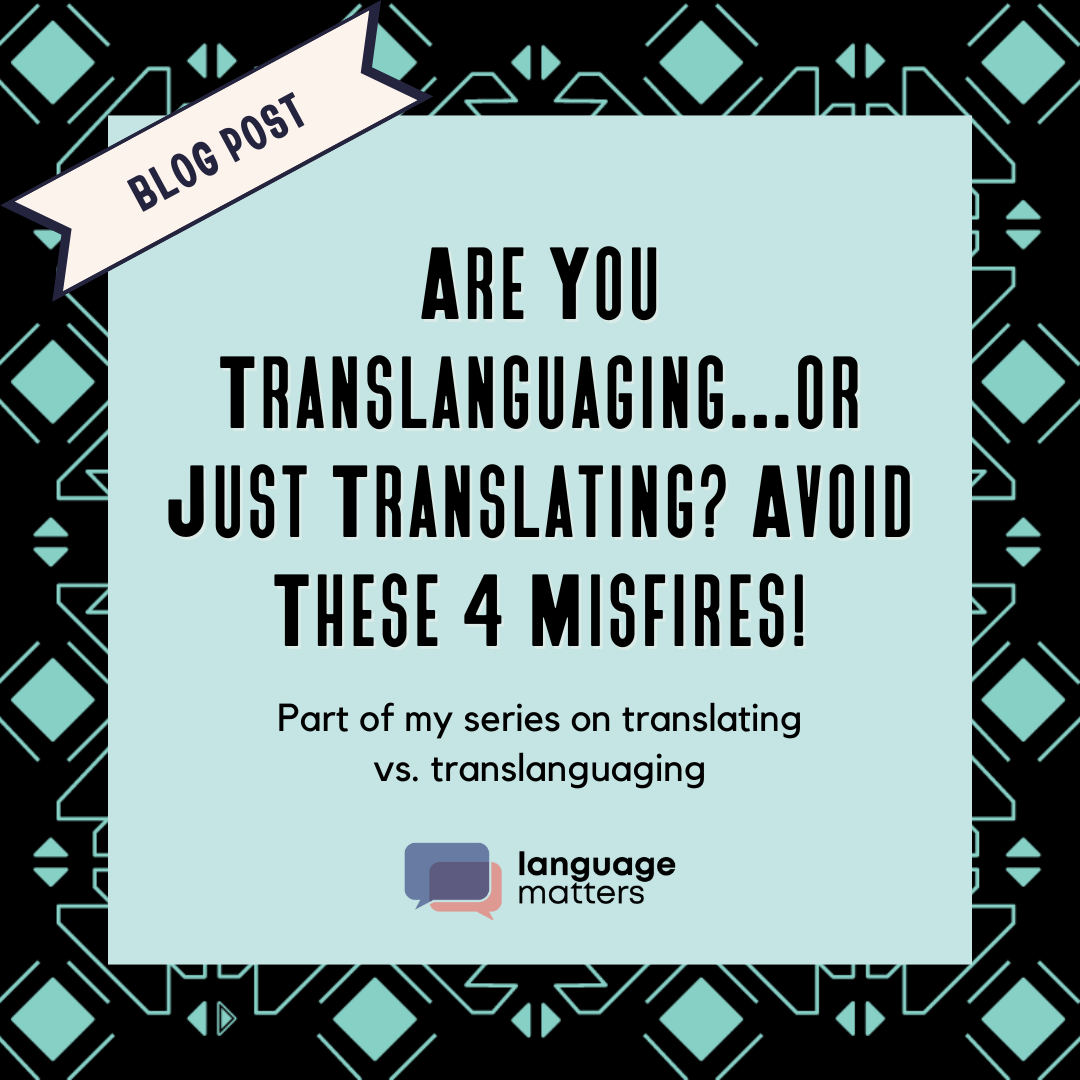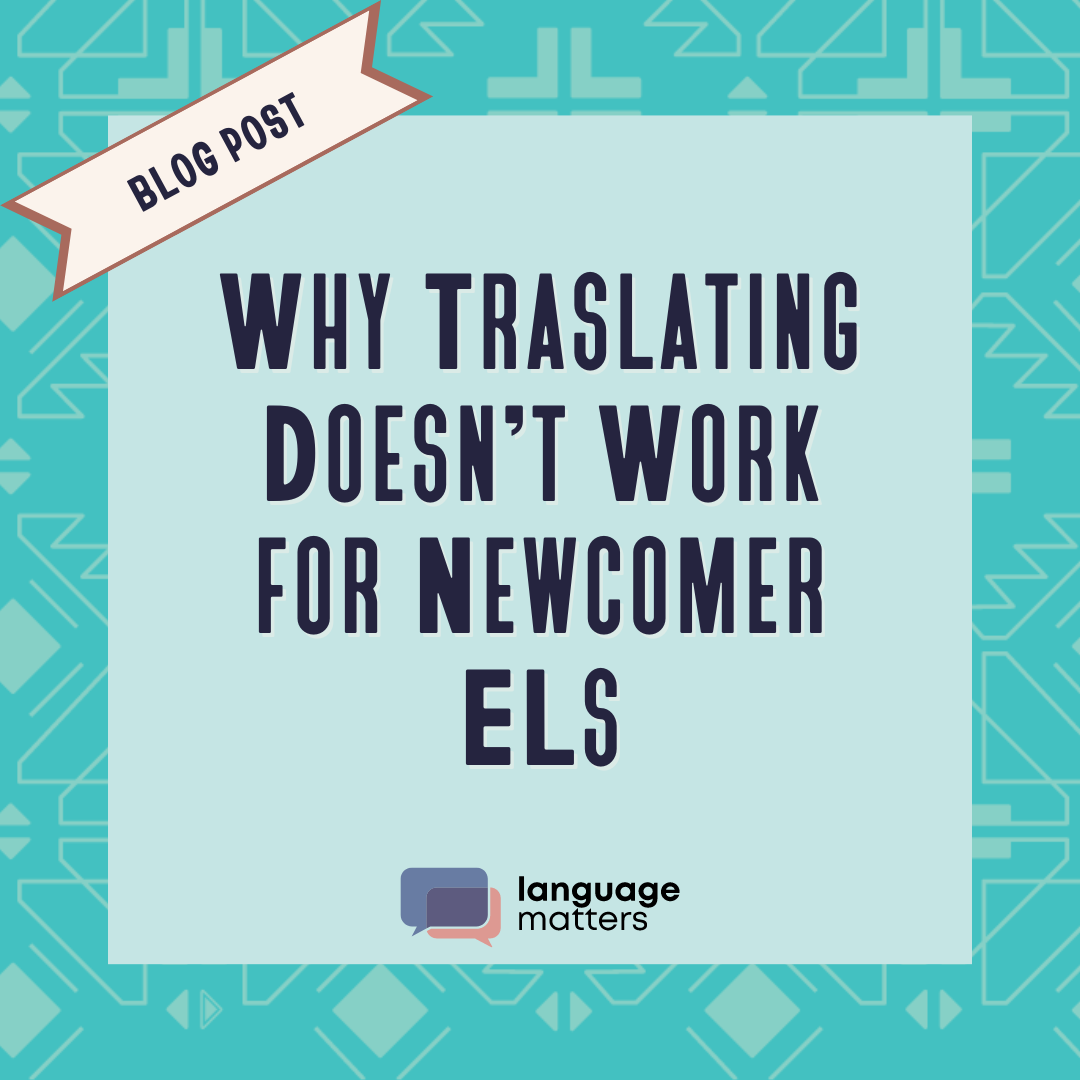Are You Translanguaging...or Just Translating? Avoid These 4 Misfires!
Translation tools arent the problem, translation-as-pedagogy is.
Read Lillian’s latest blog on the topic of translating vs. translanguaging. Don’t miss the free guide!
Everyday heroism looks like this
When the sky feels like its falling, and you grow weary from efforts to fight for emergent bilinguals, you can look to the everyday heroes who are making a difference. Click to read about one such heroine.
Your Voice, Their Freedom: Why Free Speech is Your July 4th Homework
Teachers are no strangers to censorship. But lately, it’s not just about banning books… It’s about silencing the very words that support multilingual students. Read this post about what you can do this July 4th to speak up in the name of linguistic justice.
Advocacy for MLLs: Am I Doing This Right?
It’s time to move past the belief in just “one right way” to do advocacy for our MLLs. Turns out (on the basis of my research) there are 5 types of Disruptor/advocates. Whether you’re the outspoken Rebel Rouser, or the softer Mediator, there is a place for you to properly and skillfully advocate for your MLLs. So read on because the Monolingual Bias stops for no one.
Unmasking the Monolingual Bias
“My ELLs are so far behind…. they can’t read full ESSAYS!” Sound familiar? This post dissects the deficit thinking that accompanies a Monolingual mindset steeped in assimilation forces. Through video testimonials and a pretty cringey opening story, you’ll be able to spot the Monolingual Bias in no time.
My First Disruption Story
It’s early 2025 and the threats to bilingual education have never been so violent in modern US history. From Trump signing EOs to hunt down and deport immigrants to enshrining English as the official language of the country, now is the time to build our skill sets around advocacy and teacher empowerment. NOW is the time to Disrupt the Monolingual Bias.
3 ways to add translanguaging to your language objectives
Read this blog to learn 3 ways you can infuse translanguaging practices into your daily language objectives. Hint- it takes more than having Google Translate on standby.....
Disrupt the Monolingual Bias this Hispanic Heritage Month
How can you carve out spaces this Hispanic Heritage Month to listen to Latinx voices- those of your students AND teachers? Read on to discover how you can cause un desmadre in the attitudes and beliefs that embody the Monolingual Bias in the US education system.
The White Listening Subject: Part 2
In part 2 of the series on sociolinguistics, learn how two scholars disrupt the Monolingual Bias by uncovering how linguistic prejudice shows up in everyday classroom conversations. Then, join the movement to Disrupt the Bias (free download included!)
The White Listening Subject: Part 1
During a coaching session with a group of equity-minded administrators, I had one ask me, “Is there any evidence regarding how working on Monolingual Bias impacts a school district as far as positive outcomes?” Well, the answer is: no and yes.
See, it all has to do with sociolinguistics… read on to learn why.
Why Translating Doesn’t Work for Newcomer ELs
Have you noticed the trend for teachers translate constantly for their newcomer refugee ELs? Well, it doesn’t work. Read more about how the Monolingual Bias conditions teachers to operate through a one-language-mindset, and find 3 helpful ways to solve the translation problem.
Doable Disruptions to the Monolingual Bias
Change doesn’t happen in big sweeping policy gestures or with the arrival of award-winning curriculum, it happens by engaging in doable disruptions to the Monolingual Bias, and it starts with you. The only question is: how disruptive are you willing to be?
Disrupting Gentrification in Dual Language Bilingual Ed
How did we go from a nation that attempted to eradicate bilingual education programs to a nation scrambling to secure seats in DLBE programs? Read on to learn about the threats to equity in DLBE and how you can take steps to right those wrongs.
Is language a right or an enrichment?
Do you believe it is everyone’s right to speak their heritage language, even (especially) if that language isn’t English? This post offers a brief history of Dual Language Eilingual Education in the US and explores tensions between demographic groups that have emerged over time. We look at how the Monolingual Bias creeps into Dual Language classrooms in some surprising ways.
Who Benefits (and doesn’t) from Translanguaging?
Want to know who benefits from a translanguaging framework? Hint, it may have something to do with the Monolingual Bias… Click to learn (or possibly unlearn) some important facts about translanguaging.
The paradox of biliteracy and assessments
If we’re going to talk biliteracy, we need to talk assessments. This blog post follows the cutting-edge research on biliteracy assessment, and offers 3 resources to support your work with bilingual learners in mind today!
A Biliteracy Mindset
Biliteracy means full language and literacy development in two languages. And this is something we can offer our students by bringing a biliteracy mindset into our classroom. A biliteracy mindset simply asks us to view a heritage language as an asset rather than a deficiency. Click on to read more about how YOU can develop a biliteracy mindset!
Toxic Ideologies and a Recipe to Save the Day
My name is Dr. Lillian Ardell, and I am delighted to guide and collaborate with you to disrupt the monolingual bias. This post points to the toxic ideologies in our Bilingual Ed system. Join the movement!
introducing: disrupting the monolingual bias
Welcome to the first in my series of blog posts about how to disrupt the monolingual bias in bilingual and TESOL education! I’m Dr. Lillian Ardell, speaker, bilingual ed coach, and monolingual bias disruptor!
If you are a bilingual, dual language, ESL teacher or school leader who cares about equity and social change for our ELLs and Multilingual Learners, then you’ve come to the right place!
Why Structured Literacy is BAD for our MLLs
What worries me about the state of reading instruction for bilinguals is how structured literacy initiatives, like Science of Reading, are narrowing the spotlight on what counts as effective literacy growth or proficiency. It’s time to call for a more expansive, and nuanced, lens on what counts - and what works! - for the reading instruction of MLLs. Read on to learn conmigo, mi gente.



















